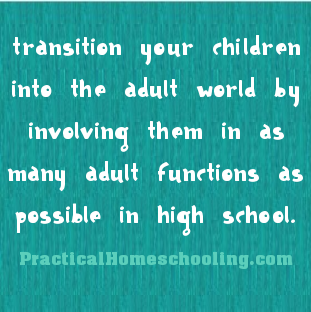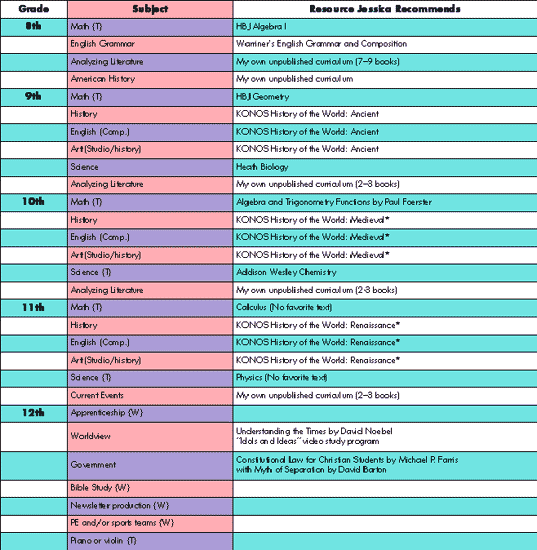 Eighth grade is the doorway to high school. It’s also when we Hulcys
finish our lessons in basics such as English grammar, and when we gear
up for four years of practice in discernment and communication skills.
Eighth grade is the doorway to high school. It’s also when we Hulcys
finish our lessons in basics such as English grammar, and when we gear
up for four years of practice in discernment and communication skills.
In ninth through eleventh grades the focus in our English class moves
from grammar to composition and analysis.
Discernment and communication are necessary for everyday life. Both
these skills are developed by analyzing literature. Our children read
and analyze seven to nine books a year. I look at a list of books that
“every educated person is supposed to have read before he goes to
college,” but in reality most educated adults have not read a tenth of
after they graduate from college, and choose the books I deem best for
each child. I mix books from the “every educated person” list with my
own selections such as The Bronze Bow, The Screwtape Letters, and I
Heard the Owl Call My Name.
Our children sharpen their communication skills by writing papers about
these works and by helping us publish the KONOS newsletter.
9th–12th Grades: “Let’s Talk About It”
In 9th–11th grade we use the three-year program KONOS History of the
World. This curriculum is activity- and research-based and involves
students in a lot of discussions with adults. Dialogue is important for
all children, but it is extremely important for high schoolers as they
move from childhood to adulthood. Instead of allowing teenagers to
bounce ideas off other teenagers, in KONOS History of the World students
record their opinions and answers to heavy questions in a journal and
then talk with parents about their answers.
For twelfth grade we choose Summit Ministry’s Understanding the Times
curriculum, the “Ideas and Idols” video program, and Michael Farris’
Constitutional Law to stimulate dialogue on philosophical topics.
In order to develop a mature thought process and worldview, teens need
to compare and contrast ideas, as well as learn to project the
consequences of certain ideas. Talking issues through with parents helps
teens form their own ideas based on knowledge rather than peer pressure,
as well as build lasting relationships long after discussion ends.
One might ask, “Why so much history and philosophy?” I am convinced that
the liberal agenda is destroying America. This ideology is able to
flourish only because several generations do not know history. The ideas
of the 18th-century “Enlightenment” today are materializing in the form
of the GATT treaty and other stepping stones to one-world government.
Youth need to see the connection beetween old ideas and new agendas.
That is why I teach a Current Events class which requires students to
research working agendas such as OBE, Planned Parenthood, America 2000,
social security, agriculture subsidies, etc. Here they learn to chase
down information on both sides of each issue. I include current books
such as Why Johnny Can’t Tell Right from Wrong and None Dare Call It
Treason.
If you think these topics are too depressing, you can always substitute
others. Most important is the measurement of current agendas against
Scripture. Hence, we study the Bible daily.
Secular Texts Offer Uncluttered, Efficient Approach
Some would be aghast that I use secular textbooks. For biology my
reasons are simple. I want my teens to know what the masses are being
fed and be prepared to meet every argument for evolution. Christian
supplements provide them with accurate scientific argument to combat
evolution. We select math and science texts not because they are
sprinkled with Bible verses or because a biography of an obscure
Christian scientist appears in the margin, but because math formulas and
scientific laws, by being constant and orderly themselves, point the way
to the orderly, constant God who created them. Uncluttered secular texts
that teach basics and applied basics offer a complete, efficient
approach to English grammar, math, and science.
12th Grade: “Do As I Do”
Modeling behavior to our children is so important. How can we obey the
Scriptures that tell us to teach our children when we walk, talk, and
sit with them if they are not with us?
We have personally chosen to involve our children in as many adult
functions as possible. Our oldest son spent his senior year apprenticing
in the KONOS business. Not only did he learn how to run a small
business, but he witnessed customer service, communication skills, and
wise decision-making policy at his father’s elbow. The next two boys
attend all kinds of political functions with me, from lobbying to
working on campaigns.
As I attempt to better the world we live in, I show my children how to
get involved. Though the activities we participate in are worthwhile,
the most important part is that our children learn adult behavior and
build good relationships with us.
